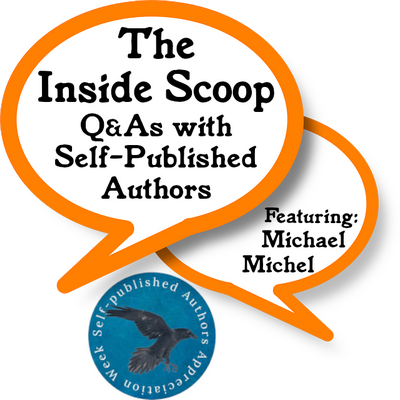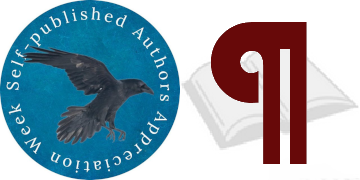
Michael Michel is another author that came to my attention (and this series) thanks to JCM Berne. I really enjoyed his answers here and our interactions around this. Much like every grimdark author I’ve heard interviewed, you wouldn’t think someone this fun could produce something so…well grim and dark. Hope you enjoy this half as much as I did.
Before we get into things, why don’t you give the reader a brief introduction to you and your work.
I’m the debut author of “The Price of Power,” a grimdark epic fantasy book about loss, redemption, grief, and the danger of beliefs. It’s like Game of Thrones meets X-men, or First Law meets a plot. At least, those are the two series my reviewers liken it to most often. I often find myself flattered by what folks say about it.
Social and Links
FREE NOVELLA: https://dl.bookfunnel.com/f1vi1k6lx9
The Price of Power: https://www.amazon.com/Price-Power-Book-1/dp/B0BTKZPNF9/ref=cm_cr_arp_d_product_top?ie=UTF8
Twitter Handle: @Michael__Michel (that’s two underscores in the middle)
Instagram: @michaelmichelauthor
What kind of costs are associated with self-publishing a book? Do you hire one or more editors, or one editor for a couple of passes? Cover artist? Anyone to help with layout, design, etc.? Beta readers? Or do you take it all on yourself? Are you actually making any money at this, or are you still focused on breaking-even while building an audience?
More costs than you might think. At least, more than I was aware of. The more common ones are book cover ($500+ for a good one) and editor (varies by need but upwards of a $1,000 for a big book). I hired a proofreader only, but that’s not recommended for everyone. The editors I reached out to said it was pretty polished, so you have to work really hard if you want to save on editing. Beta readers assisted with all the same duties a developmental editor would have, so that was an easy skip for me. I formatted it myself, too, but found it to be more fun than expected. Atticus is great and you only buy it once—same with Scrivener which I needed for a novel/series as expansive and convoluted as mine. Those are all the expenses one might expect. The hidden costs are things like ISBNs, BookFunnel, websites and newsletter builders, and a ton more software-type crap like that. If you want to market well, you’ve got to be setup to do so. And giveaways…I’ve given out a lot of ARC copies ($25 a pop if physical) and there are those, more successful than I, who gave out way more.
I’m making money, sure. Getting better all the time and my Kickstarter was a success. Am I making a net profit though? If I am, it’s negligible. This year is all about setting up for the long haul. I’d say that’s the rule more than the exception. New authors be prepared to invest if you’re serious.
What made you decide that self-publishing was the direction you wanted to go? How often do you question that choice? How do you get through the self-doubt?
I actually wanted to go traditional. I thought indie was less credible, and let’s be honest, in comparison to traditional, it still is a lot of the time but not to the level it used to be. Great authors are now coming out of the indie scene at an ever-increasing rate. When I made the choice, I’d just started reaching out to agents. Maybe fifteen of them. Got a partial request pretty quickly but it fizzled just as fast. I didn’t see the point in continuing. My energy dragged while doing it, and the outlook of ever seeing my novel published seemed so far away. I have a driven mentality and a decent self-marketing skill set, but even this didn’t fully convince me.
My friend, Jerry Oltion, has that honor. If you don’t know him, he’s a Nebula winner, multi-time Hugo nominee, writer of Star Trek books, and is the most published author in Analog Magazine’s history (with like 100 short stories). Suffice it to say, I needed someone with credibility to kill my dreams of credibility. He said, “I think the New York dinosaur has just about breathed its last.” It was a long email, full of convincing reasons to go indie—all from a trad author, no less. It was just the push I needed, and I couldn’t have been more excited to make the leap afterward. I felt free.
I’ve probably already made as much as the average trad author makes on a book. And I’ve retained total control. With more books lined up, I feel like it’s a good position to be in.
I absolutely question my decision sometimes. On days when I make less than a dollar. On days when I get less than a five-star review. On days when I’m sucked up in social media all day when I would rather be writing. Self-doubt sticks to the sedentary, so I just make sure to keep plowing forward.
Have you thought about trying to get a deal with major (or indie) publishers for upcoming works, or are you planning on sticking with self-publishing?
Here’s the thing. Once you go indie, you’re kind of locked in unless you become very successful. Publishers want to know what your indie sales have been, and if they aren’t amazing, they see that as a sign it’s probably not going to work with them either. Conversely, if you do really well as an indie author, then there’s less point in going traditional because you’re likely making more and retaining all the control.
That said, if a big trad publisher came along with a hefty advance, I’d probably take it even if it meant less money long-term. The exposure, the validation, and the chance to rub elbows with other trad authors under the same organizational umbrella is too great an opportunity to pass up. It’s not all about the money for me anyway. It’s about producing the best product I can and entertaining the hell out of people. Honestly, having access to the best-of-the-best editors is very alluring. I often wonder how good my book could be if it had a premier expert combing over it six times. Better, I expect. Much better.
Self-publishing tends to have less external deadlines keeping one accountable. How do you maintain your work process or work ethic?
Let me lead with the caveat that everyone is different. Carrot or stick, you do what you have to in order to create art. Drink raw eggs, sleep upside down, sacrifice a bull, or sip a coffee: it doesn’t matter. Just get it done. I take this approach to a degree as well. Although, readers telling you nice things and saying they want more is always a major motivator.
I consistently set 1-2 months goals. Once I have that signpost, I get pretty excited and the energy starts to flow. Fortunately, writing is one of the things I love doing most. A note on goal setting though: don’t set a goal that isn’t achievable. Whatever you think you can accomplish, stretch it a bit or reduce your aspiration. Better to guarantee success than miss your ambitions by a mile. Good for the brain (specifically, the nucleus acumbens).
How do you decide a book is finally finished and ready? (or how do you avoid “perfection as the enemy of good”?)
It’s usually accompanied by the sound of your soul shrieking and a little part of you dying. Haha. Kidding…kinda. Letting your ego die in order to publish is the both the suffering and freedom we authors live by.
Perfectionism itself is a double-edged sword. I like to think of rockets launching into space. Giant fuel cells known as “stages” are jettisoned as the rocket climbs through the atmosphere. Once their fuel is used up, they’re dead weight.
Perfectionism is the same; it pushed me to make, “The Price of Power” as good as it could be, but at some point, I needed to let it go in order to coast smoothly to my next endeavor. Even now, I still read sections of my book sometimes and find a dozen things per page I might change. Well, as authors, we’ve got to understand a valuable principle:
We’re always growing, and honing our craft.
The more we write, the better we get. By the end of draft 5, you’ve got ideas about how draft 6 could be better. Every work you write makes you better at writing. If you understand this, you’re better able to let go and move on knowing the next will demonstrate your current skill more clearly The work grows with us. This what kills Patrick Rothfuss, I think. He can’t help himself but to rewrite more.
I’ve found that people don’t care as much about the nitty gritty as I do, anyway. Look no further than Brando Sando as an example. The man’s not the greatest writer, but damn can he produce a bunch of novels and keep readers’ imaginations well-fed. Readers want authors that satisfy their needs, not the authors’ own ego.
In conclusion, perfectionism is a good tool, but a bad way of life.
That’s a good line. I should try to adopt that.
Thanks for your time and participation! Hope you enjoyed it! And do know that there are many of us out here who appreciate and applaud what you do (and our number is growing)!
Be sure to check out Michel’s novel—looks like a great grim time!

The 2023 Self-Published Authors Appreciation Week Logo was made by Witty and Sarcastic Book Club



allyson johnson
Just letting you know how much I am enjoying these Q&A sessions from indie authors. I have thought about self-publishing, but as you know I decided with my first novel to just put it on line and let it find its audience ( FOX SPIRIT published on ajmccready.wordpress.com. It’s a VERY slow process, but some interesting feedback). Self-publishing would be a different commitment. My next novel (in second-draft form) will probably go that route.
HCNewton
That’s exactly what I want to hear! Thanks, Allyson!!